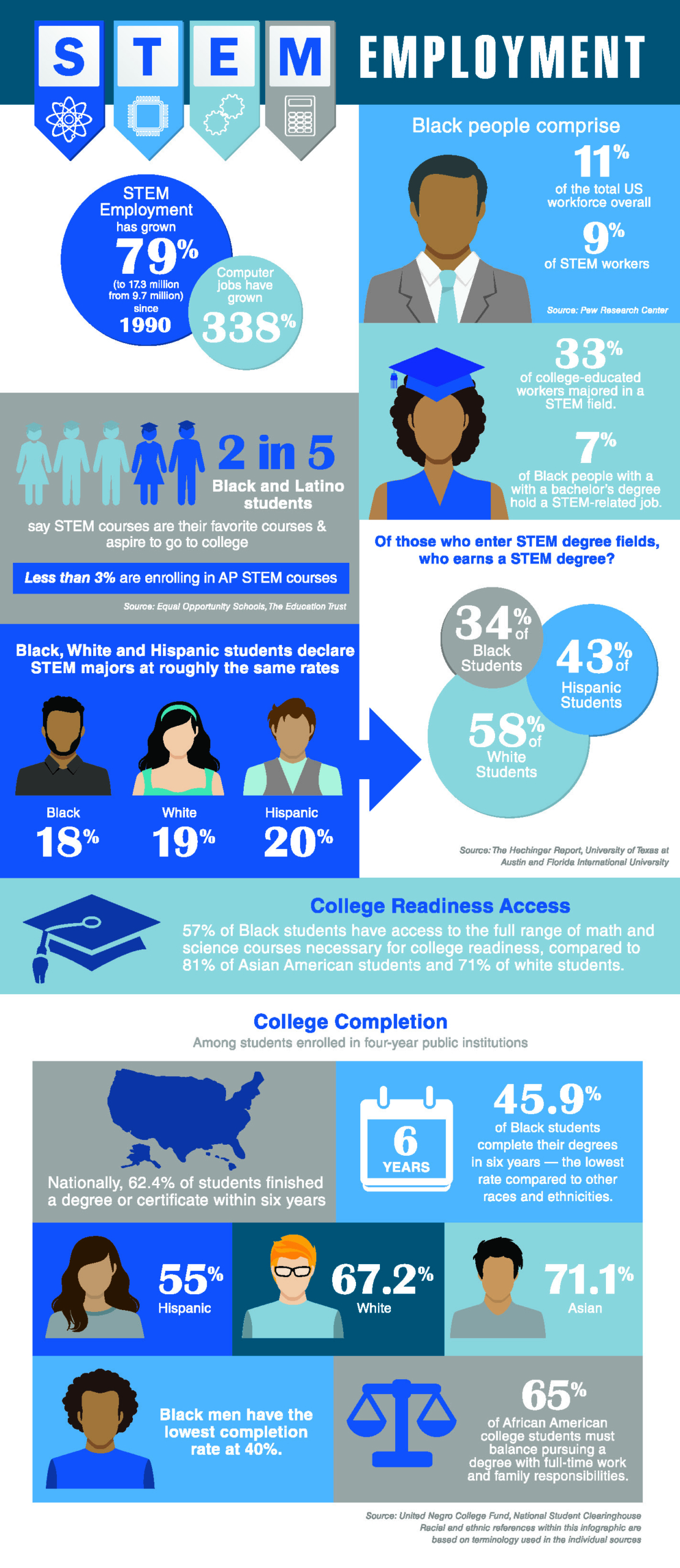Primary Talent Partners’ mission is to increase minority candidate flow in the contingent labor programs they service. “We understand that there are many contributing factors to the underrepresentation in the workforce: hiring manager bias, racial profiling, etc.,” says Chad Douglas, PTP’s founding partner and chief revenue officer.
In 2019, a study published in the journal Education Researcher found that although students of all races enter STEM majors at roughly equal rates, Black and Latino students leave the major at nearly twice the rate of white students.
There are many contributing factors that influence this development, including the fact that many of these Black and Latino learners come from low-income families and do not have the same access to academic resources that typically support students through school. But these learners in other competitive majors like business don’t have the same attrition rates. So what causes this?
Various subsequent studies have shed light on this, revealing that students tend to avoid or switch out of majors based on social factors. Students tend to gravitate toward majors where more students look like them. In other words, exclusion or lack of belonging has a significant impact on educational success and persistence, especially for students of color. Sense of belonging is associated with academic achievement, retention and persistence in college.
As Douglas and co-founder Tinisha Bookhart, executive partner, director of IT practice, dug deeper into the causes of the underrepresentation, they discovered two elements they felt Primary Talent Partners could address that would help increase Black representation in STEM fields. First, Black STEM students aren’t graduating at the same rates as their white peers, citing a “lack of funding” as a primary reason, Douglas says. Second, Black workers “lack of a feeling of belonging” in the STEM industry (see accompanying infographic).
Addressing STEM students’ lack of funding head-on, PTP devotes a percent of revenue for every hour they bill their clients to fund scholarships at Historically Black Colleges and Universities — particularly the midsize and smaller HBCUs that most corporations do not engage with as part of their own DE&I efforts. PTP co-brands these scholarships and creates pathways for their clients to better engage these HBCUs, often influencing curriculum to better prepare students for post-graduation.
In terms of belonging, a study from the National Science Foundation and National Center for Science and Engineering Statistics indicated that students of color who major in STEM are significantly less likely to report a sense of belonging than white STEM majors. Among Black and Latino respondents who left college, more than 60% reported a lack of belonging in their STEM majors.
To foster a feeling of belonging, PTP created a program through which Black professionals mentor Black scholars to help them overcome the lack of feeling of belonging. In addition, the organization hosts “graduation prep academies where Black professionals are invited to help our graduating seniors better prepare for life outside the walls of the HBCU,” Douglas says.
Additionally, Douglas and Bookhart created an intern program to help its scholars get access to better internships. PTP also provides housing and clothing stipends to make sure these scholars can afford to travel to internship locations and present themselves well on the client site.
Where Black people do feel represented, progress is clear, though there is much work still to be done. Though HBCUs comprise just 3% of the country’s colleges and universities, they enroll 10% of all African American students and produce almost 20% of all African American graduates. An HBCU graduate can expect to earn an additional $927,000 in their lifetime, which is 56% more than they could expect to earn without their HBCU degrees or certificates.
For more data involving Black people in STEM education and careers, refer to the infographic that accompanies this article.
To learn how Primary Talent Partners can help your company effect change for Black STEM candidates, contact Chad Douglas at chadd@primarytalentpartners.com or 704-719-6463.

Sources
- Riegle-Crumb C, King B, Irizarry Y. “Does STEM Stand Out? Examining Racial/Ethnic Gaps in Persistence Across Postsecondary Fields.” Educational Researcher. 2019;48(3):133-144. doi:10.3102/0013189X19831006 https://journals.sagepub.com/doi/full/10.3102/0013189X19831006?journalCode=edra
- Rainey, K., Dancy, M., Mickelson, R. et al. “Race and gender differences in how sense of belonging influences decisions to major in STEM.” IJ STEM Ed 5, 10 (2018). https://stemeducationjournal.springeropen.com/articles/10.1186/s40594-018-0115-6
- Funk, C., Parker, K. “Diversity in the STEM workforce varies widely across jobs.” Pew Research https://www.pewresearch.org/social-trends/2018/01/09/diversity-in-the-stem-workforce-varies-widely-across-jobs/.
- Bridges, B. “African Americans and College Education by the Numbers.” United Negro College Fund Inc. https://uncf.org/the-latest/african-americans-and-college-education-by-the-numbers
- Lomax, M., “Six Reasons HBCUs Are More Important Than Ever.” United Negro College Fund Inc. https://uncf.org/the-latest/6-reasons-hbcus-are-more-important-than-ever
- “HBCUs Make America Strong: The Positive Economic Impact of Historically Black Colleges and Universities.” https://cdn.uncf.org/wp-content/uploads/HBCU_Consumer_Brochure_FINAL_APPROVED.pdf








